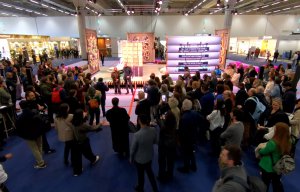
Open for business at Heimtextil 2025
Opinion


Important new bioengineered materials stand out within impressive display.

15th January 2024
Adrian Wilson
|
Frankfurt, Germany
A wide range of new fibre and raw materials options were showcased at the Heimtextil Trends 24/25 display area within the home furnishings show which took place from January 9-12 in Frankfurt.
Under the banner of New Sensitivity, many textiles featured were made from plant-based crops or their by-products, as well as some important new bioengineered materials, including synthetic polyesters and nylons engineered to much more rapidly biodegrade on land or in oceans.
Balance
“Sensitivity often relates to touch and sensation but it is also about showing consideration, empathy and respect,” explained New Sensitivity director Anja Bisgaard Gaaede, of Denmark-headquartered SPOTT trends and business. “In this context, it means considering impact when making a decision or creating a product. Understanding how natural ecosystems work and prioritising balance as the default are key to maintaining a sensitive way of working.”
Businesses, she added, are adopting new sustainable practices and politicians creating new legislation from a much more sensitive starting point that takes into account function, life cycle and impact.
“The United Nations Sustainable Development Goals (SDGs) have been a significant driver in the necessary transformation to an era of New Sensitivity and our aim was to reflect how this transformation can be embodied in home textiles,” Bisgaard Gaaede said. “In this 2024 trends collection there is as much emphasis on what materials are made as their aesthetic appeal.”
Natural selection
The new cellulosic fibres from fast-rising Scandinavian companies such as Renewcell and Spinnova were heavily featured, alongside natural fibres such as hemp, jute and wool.
Less established natural fibres were displayed in products such as Bananatex, a durable, technical fabric made purely from abaca banana plants, Oleatex, an alternative leather made from waste derived from the olive oil industry, and Desertto, another alternative leather derived from the Mexican cactus.

Bioengineered textiles included Bio-Tex from Modern Meadow – made from proteins and delivering the same colour vibrancy and performance as traditional chrome-tanned leather with a 90% reduction in impact – and Shorai, a textile produced from bacterial nanocellulose by Bucha Bio.
Mycelium – the vegetative state of mushrooms – was highlighted as another new source of raw materials in a textile produced by Mogu.
Biodegradation
Bio-engineered synthetic fibres are already having an impact and fabrics created to incorporate both CiCLO from Intrinsic Advanced Materials/Parkdale Mills, and PrimaLoft Bio from Fiberpartner, were also highlighted in the New Sensitivity collection.
These are additives that can be applied at the fibre extrusion stage to enable the accelerated biodegradation of synthetic fibres.
CiCLO creates countless biodegradable spots in the matrix of the polymer that enables microbes that naturally exist in certain environments to break down the materials just like they do with natural fibres. All that remains are natural biogases and biomass.

The mechanism is only activated under conditions that allow for biodegradation and they will not prematurely deteriorate while in storage or use, just like biodegradable fabrics made from natural fibres like cotton and woool.
Long term studies prove that CiCLO polyester and also nylon fabrics biodegrade at greatly accelerated rates compared to such fibres without them.
Parkdale Mills has rapidly established a network of around 45 certified fibre and yarn manufacturers to ensure quality assurance and traceability in the supply of CiCLO products.
PrimaLoft Bio has also been specifically designed to biodegrade in landfills and ocean water and according to independent testing, fabrics incorporating it have reached 93.8% biodegradation in 646 days when exposed to an accelerated landfill environment. At the conclusion of the test, the remaining material was found to contain no trace of plastic, leaving behind only natural, carbon-based elements.
Fiberpartner also introduced PolyPlant, a new polyester derived from sugar cane, at Heimtextil 2024.
Polyplant is said to have all of the widely appreciated qualities of polyester, while not sharing its negative impact on the environment. It is 100% bio-based, non-toxic and safe, recyclable and renewable and also biodegradable. In addition, its production enables a 75% reduction in carbon footprint compared to the production of virgin PET and it can be engineered to enable moisture-wicking, UV resistance and flame retardancy. A PolyPlant down alternative was introduced for pillows and duvets.

As the global demand for fibres accelerates in the next few years – demand that will only realistically be met through the increased production of synthetics, and primarily polyester – CiCLO, PrimaLoft Bio and PolyPlant represent important new options for the widescale advancement of sustainable new fabrics.
New standards
Some 2,838 exhibitors from 60 countries took part in Heimtextil 2024 – an increase of 550 above the previous show in 2023.
The exibition attracted 46,000 visitors from around 130 countries, who overcame difficult travel conditions due to nationwide rail strikes and regional demonstrations in Germany during the event.
“The increase in space, exhibitors and visitors in 2024 makes it clear that this leading trade fair for home and contract textiles remains on course for growth and is setting new standards for a sustainable and AI-driven textile industry,” said Detlef Braun, member of organiser Messe Frankfurt’s executive board.

Business intelligence for the fibre, textiles and apparel industries: technologies, innovations, markets, investments, trade policy, sourcing, strategy...
Find out more